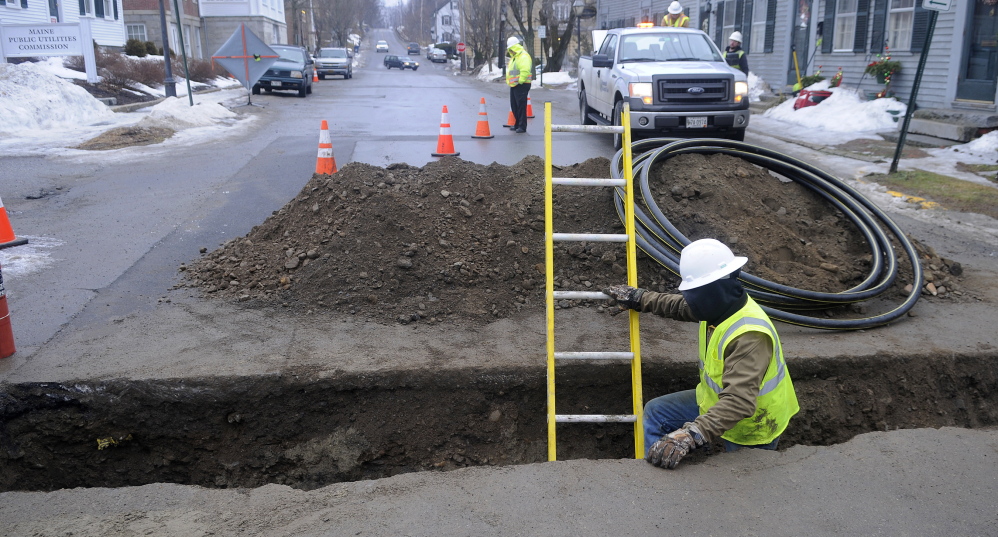HALLOWELL — The local water district wants to raise rates for most water users by 20 percent to pay for a new employee to help monitor natural gas expansion in the city.
Many utility districts in the Kennebec Valley have said the industry’s quick, unprecedented ramp-up in the area last year has strained them, as utility crews had to track existing lines under public roads while two gas companies raced to put new lines in.
That issue won’t likely go away, as the companies, Summit Natural Gas of Maine and Maine Natural Gas, have said their focus in 2014 will be expanding to serve residential areas in the region from the backbone pipelines they installed along major roads last year.
Under the water district’s plan approved by trustees, residential, commercial and other water users would see rate hikes of 20 percent. It isn’t subject to review from Maine Public Utilities Commission unless many customers petition for one. A public hearing on the hike is set for April 22 at City Hall.
The change would raise nearly $76,000 more per year for the Hallowell Water District starting July 1, which Dennis Kinney, the superintendent and the district’s only full-time employee, said would pay the salary, benefits, equipment and other costs for the new employee, who would be dedicated to the district but contracted through the Gardiner Water District.
Bigger districts have been able to weather the storm without hikes. Brian Tarbuck, general manager of the Greater Augusta Utility District, said more utilities in the ground could affect the cost of ongoing work, but it won’t result in an immediate rate hike in his 40-employee district.
Kinney said the new employee would be largely tasked with monitoring Summit Natural Gas of Maine pipeline installation in Hallowell, where the company plans to install lines past most homes on the east side of the Maine Turnpike this year.
Under the rate change, customers using up to 1,200 cubic feet of water every three months would see bills rise to a minimum of $66, up from $55 now. State data shows that the Hallowell minimum is lower than that of nearly 70 percent of other Maine districts that charge that way. After the change, Hallowell will be close to the state median.
The Hallowell and Gardiner districts have been studying the possibility of eventually merging since 2009. A recent report commissioned by the districts says the two districts already have a purchase-and-sale agreement for water and share labor and equipment for emergency repairs and other duties.
The plan is still preliminary. The report recommended submitting legislation by 2016 to merge the districts. If passed by lawmakers, it would have to win approval at local referenda in Gardiner, Hallowell, Farmingdale and Randolph.
Hallowell’s district has merged services before. In 2007, the Greater Augusta Utility District took over its sewer system, but that relationship has been contentious. The city lost a lawsuit against the district last year after claiming its ratepayers were being overcharged for Augusta-specific work.
Richard Dolby and Jeff Kobrock, chairmen of the Hallowell and Gardiner trustees, respectively, said the boards are trying to gauge the public’s reaction to a merger plan before moving forward with Kobrock saying the idea “shows huge potential as far as making both systems stronger as far as their infrastructure and customer service.”
But the new natural gas circumstances, not preparation for a merger, necessitated the new employee, Kinney said.
Kinney was critical of the city’s oversight of expansion last year, saying, for example, that it ignored pieces of its road permitting ordinance to allow Summit to open roads past November against city ordinance. But City Manager Michael Starn said that was to aid Summit in finishing its work for the year.
Much of last year’s work took place on state roads, where the Maine Department of Transportation requires three feet of horizontal separation between utilities. On municipal roads, crews can get within one foot unless there’s a city- or town-specific standard, which Hallowell doesn’t have. To dig up public roads, companies must apply for municipal road-opening permits.
Starn said since Summit will be on local roads, the city will issue permits for a few weeks — shorter than last year, when crews were on well-traveled roads like Winthrop and Second streets. He said he is “hopeful that the water district isn’t feeling like they have to duplicate what we’re going to do.”
While Kinney said it’s unknown how much it will affect his district’s workload, there’s a potential for it to be more time-consuming than last year on roads not watched by the state.
“Once it hits the no man’s land of local roads, then it’s going to hit kind of a quagmire,” he said.
Michael Shepherd — 370-7652 mshepherd@centralmaine.com Twitter: @mikeshepherdme
Send questions/comments to the editors.



Success. Please wait for the page to reload. If the page does not reload within 5 seconds, please refresh the page.
Enter your email and password to access comments.
Hi, to comment on stories you must . This profile is in addition to your subscription and website login.
Already have a commenting profile? .
Invalid username/password.
Please check your email to confirm and complete your registration.
Only subscribers are eligible to post comments. Please subscribe or login first for digital access. Here’s why.
Use the form below to reset your password. When you've submitted your account email, we will send an email with a reset code.